Must Know Safety Tips for Living in a Van in 2024!
The allure of van life beckons many, promising life on the open road, the freedom to roam, and a closer connection to the world. As this mobile lifestyle’s popularity soars, it’s essential to address a cornerstone element: safety. In this guide we’ll deep dive into van life safety to ensure your adventures are as secure as they are thrilling.
Choosing the Right Van for Safety
Your rolling home is the foundation of your adventure. Ensuring it’s up to the task is paramount. Here are a few safety aspects to consider when purchasing a van.
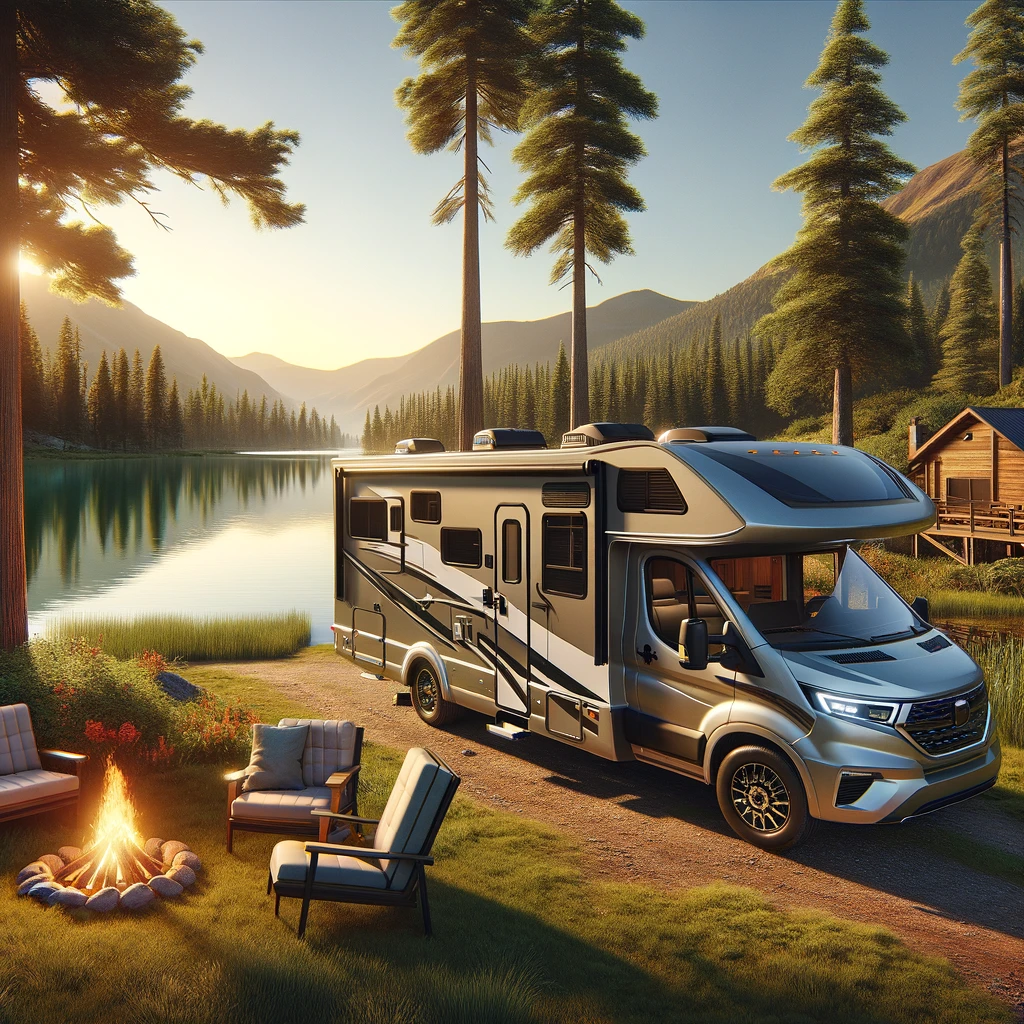
Mechanical Soundness
Before purchasing a van, conduct thorough research and seek out reliable brands and models. If you’re buying a used van, ensure you get it inspected by a certified mechanic.
Frequent breakdowns can leave you vulnerable, stranded in unknown areas, or facing hefty repair bills. To ensure long-term safety and reliability, make it a habit to monitor the health of your van’s engine, transmission, and other major components.
Size and Maneuverability
The size of your van plays a crucial role in where you can go and how easily you can get there. While a compact van can navigate urban settings and tight spots more comfortably, a larger one offers more living and storage space.
It’s vital to test drive different sizes to see which one aligns with your comfort level and intended travel destinations.
Regular Vehicle Check-ups
A van that’s used as a home is under more strain than the typical vehicle. Commit to regular maintenance schedules. Besides the standard oil changes, regularly inspect your tires for wear and pressure, brakes for efficient stopping power, and lights to ensure visibility.
Also, be mindful of the van’s weight limits; overloading can strain the engine and compromise safety.
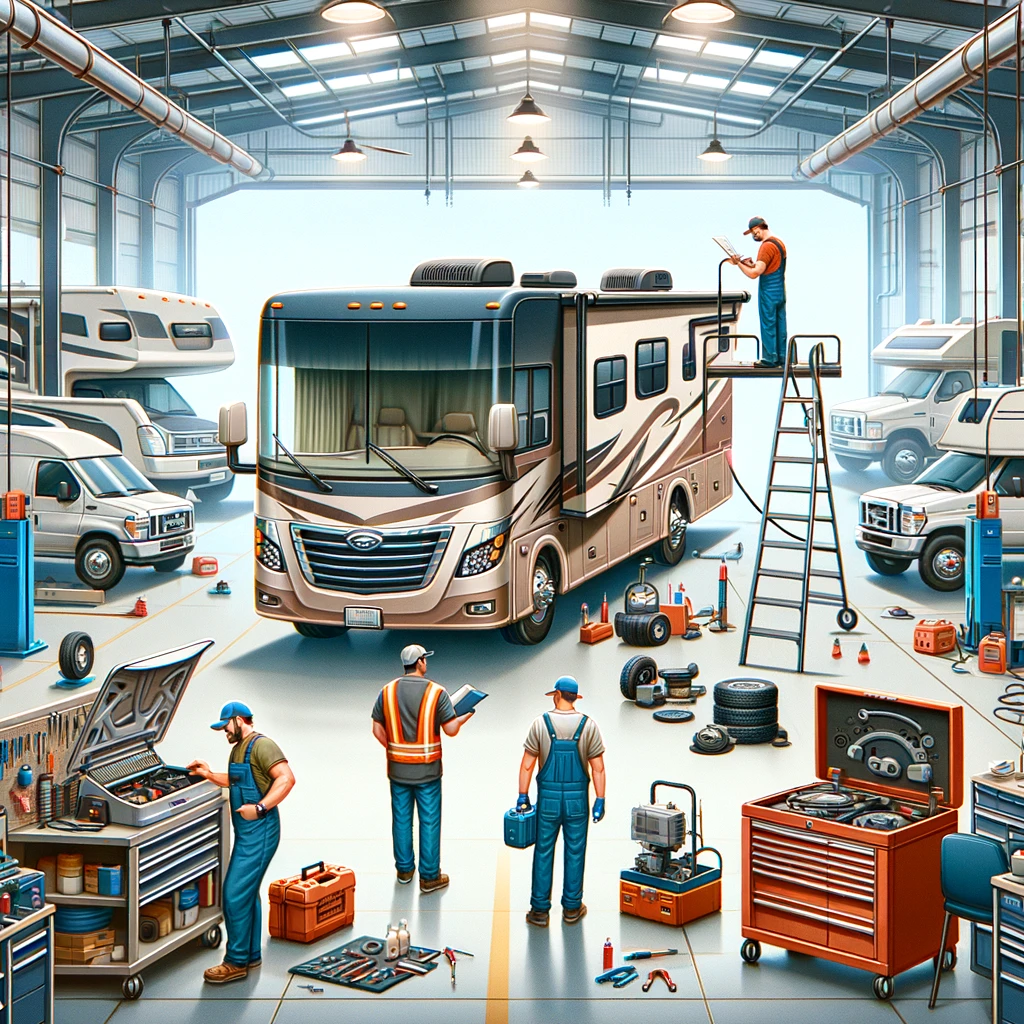

Parking & Overnight Stays
Choosing Spots
Your choice of a parking spot can greatly impact your safety and peace of mind. Look for established campgrounds or known van-lifer spots. When in urban areas, opt for well-lit streets, preferably in busier neighborhoods where there’s some night activity, reducing the chances of break-ins.
Many van lifers recommend staying a night or two in a particular spot and then moving on to avoid unwanted attention.
Blending In
The more your van looks like an everyday vehicle rather than a lived-in space, the less attention it will draw. Consider blackout curtains or reflective window covers that appear standard from the outside.Â
Keeping noise levels down, especially during late or early hours, can also help you go unnoticed.
Stealth camping is a popular choice amongst van lifers, to consider if this is right for you see our tips for ‘What Is Stealth Camping & Should I Do it?‘.
Legalities
Before settling down for the night, always ensure you’re allowed to park overnight. Many cities have bylaws against sleeping in vehicles. National parks, rest areas, and some big-box store parking lots (like Walmart) often allow overnight parking.
However, it’s always a good idea to check with the store management or local regulations. For Australian readers you can check out ‘Is it Illegal to live in your Vehicle?‘ for more information about the legalities of living in your van.
Personal Security Measures
Locks and Security Systems
While it might be tempting to rely on standard vehicle locks, living in your van warrants additional security. Install deadbolts or sliding bolt locks on the inside of your van’s doors for added protection when you’re inside.
For times you’re away from your van, consider investing in a quality alarm system or a steering wheel lock to deter potential thieves.
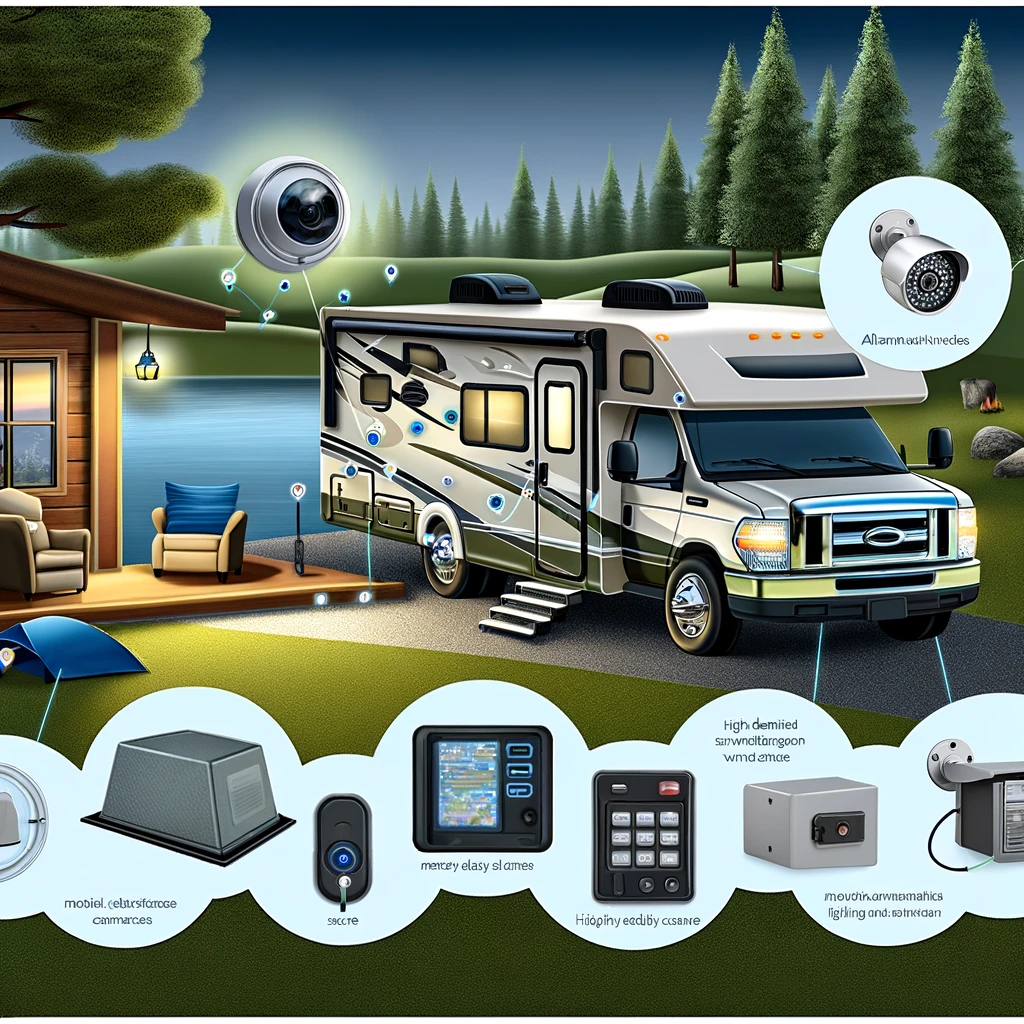

Valuables
Your mobile home isn’t just a vehicle; it’s where you keep your possessions. Avoid leaving electronics, cash, or other valuables in plain sight.
Consider installing hidden compartments or lockable storage areas to secure important items. For items like passports or essential documents, a small, fireproof safe could be a worthy investment.
Awareness
When in new areas, especially if they’re isolated, make a habit of scanning your surroundings. If something or someone feels off, trust your intuition.
Avoid divulging specific details about your living situation to strangers, and always be cautious when revealing your exact parking spot.
Emergency Exits
It’s vital to ensure that in the event of an emergency, you have an escape route. Regularly practice how to quickly exit your van, even from less conventional points like windows. Keep exit paths unblocked and ensure windows aren’t stuck or jammed.
Safety Inside the Van
Ventilation
Good airflow isn’t just about comfort—it’s a critical safety concern, especially if you use gas-powered appliances or heaters. Always ensure there’s a flow of fresh air when cooking or heating.
Install roof vents or window vents and be aware of the symptoms of carbon monoxide poisoning, a silent danger. If ventilation is a concern of your or you would like to find out more make sure to read ‘Can you run out of oxygen sleeping in a car or van?’.
Electrical Safety
With many van lifers opting for custom electrical setups to power their appliances and gadgets, it’s crucial to ensure all installations are up to code.
Use quality, insulated wires and regularly inspect them for wear and tear. Ensure all connections are secure, and consider installing a circuit breaker to prevent potential electrical fires.
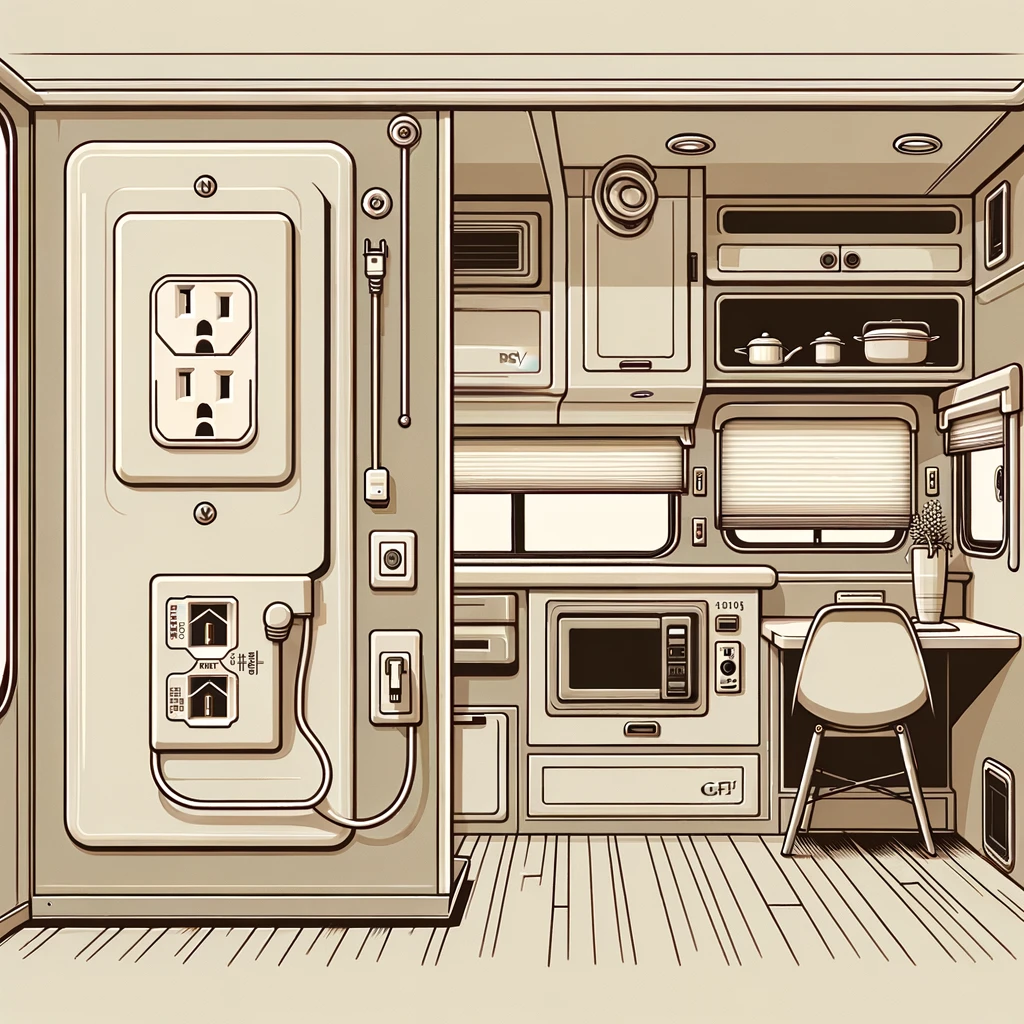

Organization
Living in a confined space can quickly become chaotic if items aren’t kept in their place. Beyond the obvious comfort factor, organized storage is a safety issue.
In case of a sudden stop, unsecured items can become hazardous. Invest in storage solutions that keep items stowed safely. Whether it’s bungee nets, Velcro strips, or built-in cabinets, make sure everything has a secure place, especially when on the move.
Fire Safety
Given the proximity of living and cooking spaces in a van, fire safety is paramount. Always have a working smoke detector and a fire extinguisher within easy reach.
Regularly check the batteries of your smoke detector and know how to use your extinguisher. Avoid using open flames near flammable materials, and always monitor cooking closely.
Health & Well-being
First Aid Kit
Accidents or minor health issues can happen, especially when you’re on the road. A well-equipped first aid kit is indispensable. Regularly check and replenish its contents, ensuring items like bandages, pain relievers, antiseptics, tweezers, and any personal medications are always available. Familiarize yourself with basic first aid procedures so you’re prepared in emergencies.
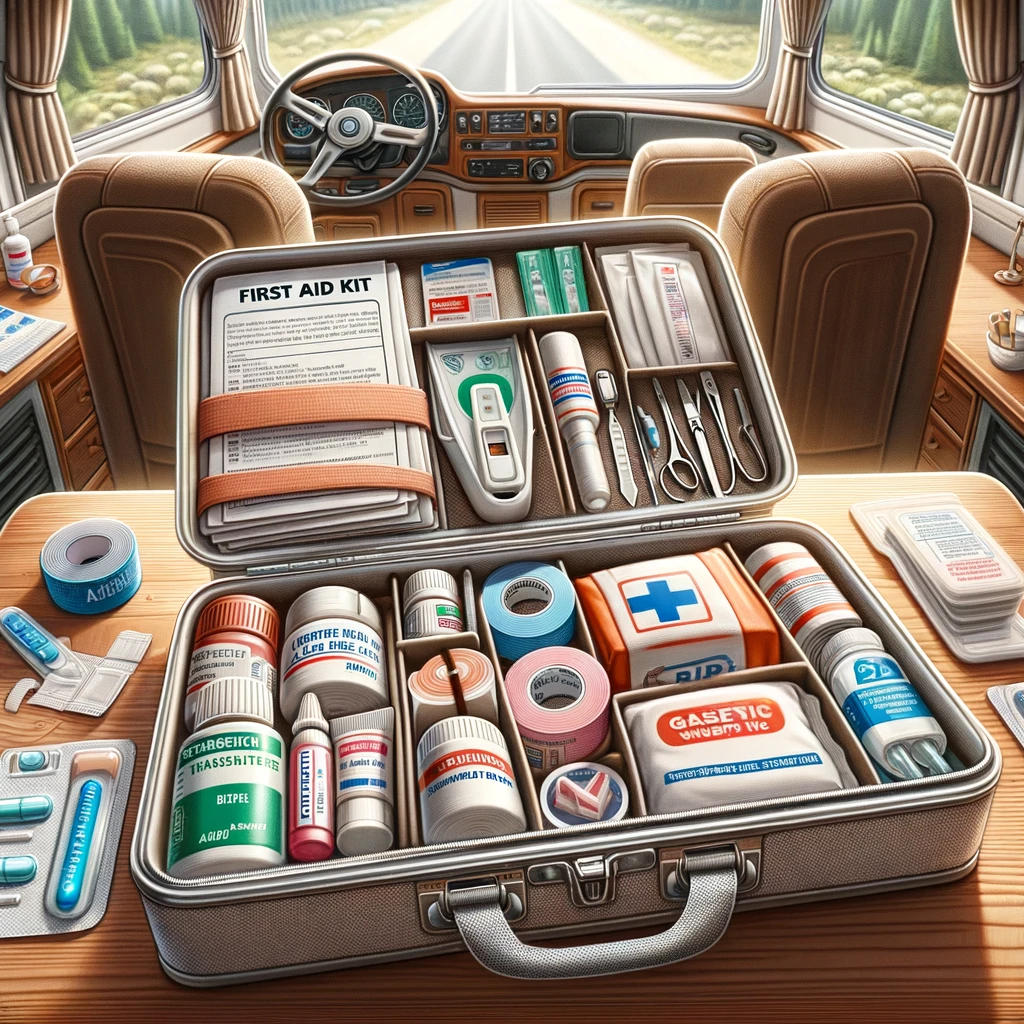

Emergency Contacts
While exploring new territories, it’s crucial to have a list of nearby medical facilities, pharmacies, or clinics. Along with these, keep a written list of personal emergency contacts, including any relevant medical information about yourself, which can be invaluable if you’re incapacitated.
Food Storage
Without the luxuries of a full-sized kitchen, proper food storage becomes paramount to prevent illnesses. Depending on your travel region and the season, invest in a good quality cooler or even a portable fridge to store perishables.
Regularly clean storage containers to avoid mold and bacterial growth. For more food store tips we’ve written a guide on ‘Safely storing food in your car or van’.
Mental Health
Life on the road can be isolating at times. Ensure you’re not just physically but also mentally and emotionally healthy. Maintain connections with loved ones, indulge in hobbies, and consider joining van-lifer communities or forums for shared experiences and support.
Weather Precautions
Preparation
Unpredictable weather can pose significant challenges. Equip your van with gear for various conditions—be it high winds, heavy rains, or extreme temperatures. For example, having sandbags can help in flood situations, while tire chains can be invaluable in snowy conditions.
Forecasts
Stay one step ahead by keeping abreast of weather conditions. Reliable weather apps or local radio stations can provide updates, ensuring you aren’t caught off-guard by a sudden storm or temperature drop.
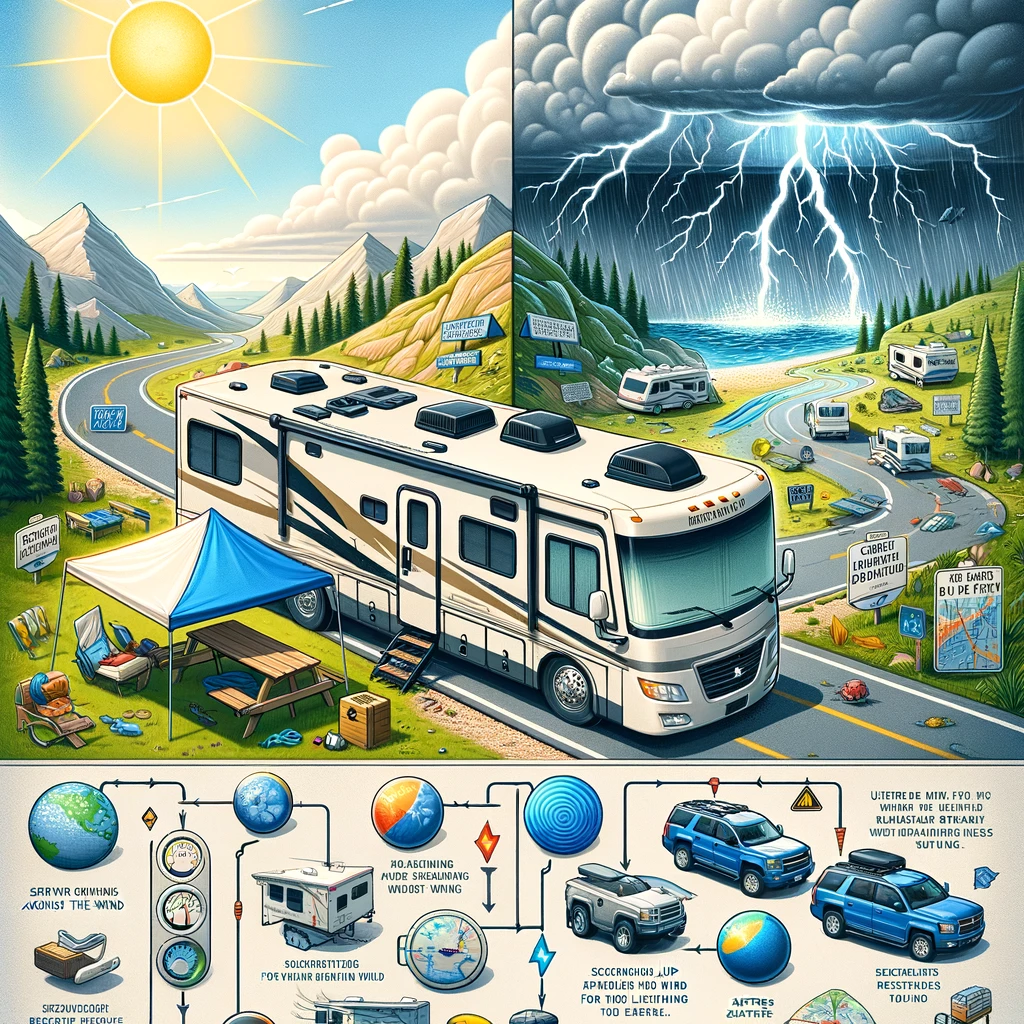

Insulation
The right insulation doesn’t just provide comfort but can also be a lifesaver. Ensure your van is well-insulated to stay warm during chilly nights and cool during scorching days. Reflective window covers can help in managing internal temperatures.
Safe Driving Practices
Weight Distribution
Your van isn’t just a vehicle—it’s a mobile home, and its weight distribution will differ from regular cars. This affects driving dynamics, especially when cornering or braking. Regularly check to ensure that weight is evenly distributed, and adjust loads as necessary.
Brakes
The added weight means more momentum, requiring more stopping power. Regularly inspect your brakes for wear and, if needed, consider upgrading to a more robust system suitable for your van’s weight.
Different Terrains
Adapting your driving based on terrain is critical. Whether it’s sandy tracks, rocky roads, or slippery slopes, each terrain has its nuances. Slow down, increase following distances, and always prioritize safety over speed.


Staying Connected
Communication
Even if you cherish solitude, being entirely off-grid can be risky. Always ensure your phone is charged, and consider investing in backup power solutions like solar chargers or portable power banks.
Apps and Technology
Numerous apps cater specifically to van-lifers, from finding the nearest campsite to sharing your location with loved ones in real time. Equip your device with apps like “Find My Friends,” offline maps, or even breakdown service numbers.
Stay Informed
Before venturing into remote areas, inform someone you trust about your intended route and how long you expect to be out of touch. This simple act can be instrumental if you face any unexpected challenges.
Interacting with Locals
Cultural Sensitivity
When you venture into new areas, especially places with distinct cultural practices or norms, it’s crucial to approach with respect and understanding. Take the time to learn about local customs, greetings, and taboos. A little effort can go a long way in fostering positive interactions.
Open-mindedness
Being open to conversations and local experiences can be enriching. However, maintain a balance between friendliness and caution. While it’s wonderful to embrace local hospitality, always be aware of your surroundings and ensure you don’t unknowingly compromise your safety.
Communication Skills
Even if you don’t speak the local language fluently, carrying a phrasebook or a translation app can be invaluable. Mastering basic phrases or gestures can help bridge communication gaps and show locals that you’re making an effort.
Offering Assistance
A great way to integrate and leave a positive impression is by offering assistance or volunteering in local communities. Whether it’s helping with community projects or simply sharing skills, it fosters goodwill and can lead to lasting connections.
Emergency Preparedness
Emergency Kits
Beyond a first aid kit, having an emergency kit tailored for various situations is essential. This could include items like a multi-tool, flashlight, whistle, extra batteries, and non-perishable food and water. Ensure this kit is easily accessible, under the drivers seat or in an easy to access cupboard is ideal.
Escape Plan
In case of emergencies like fires or threats, having a pre-planned exit strategy is crucial. Regularly familiarize yourself with escape routes, ensuring you can exit swiftly even in low visibility situations.
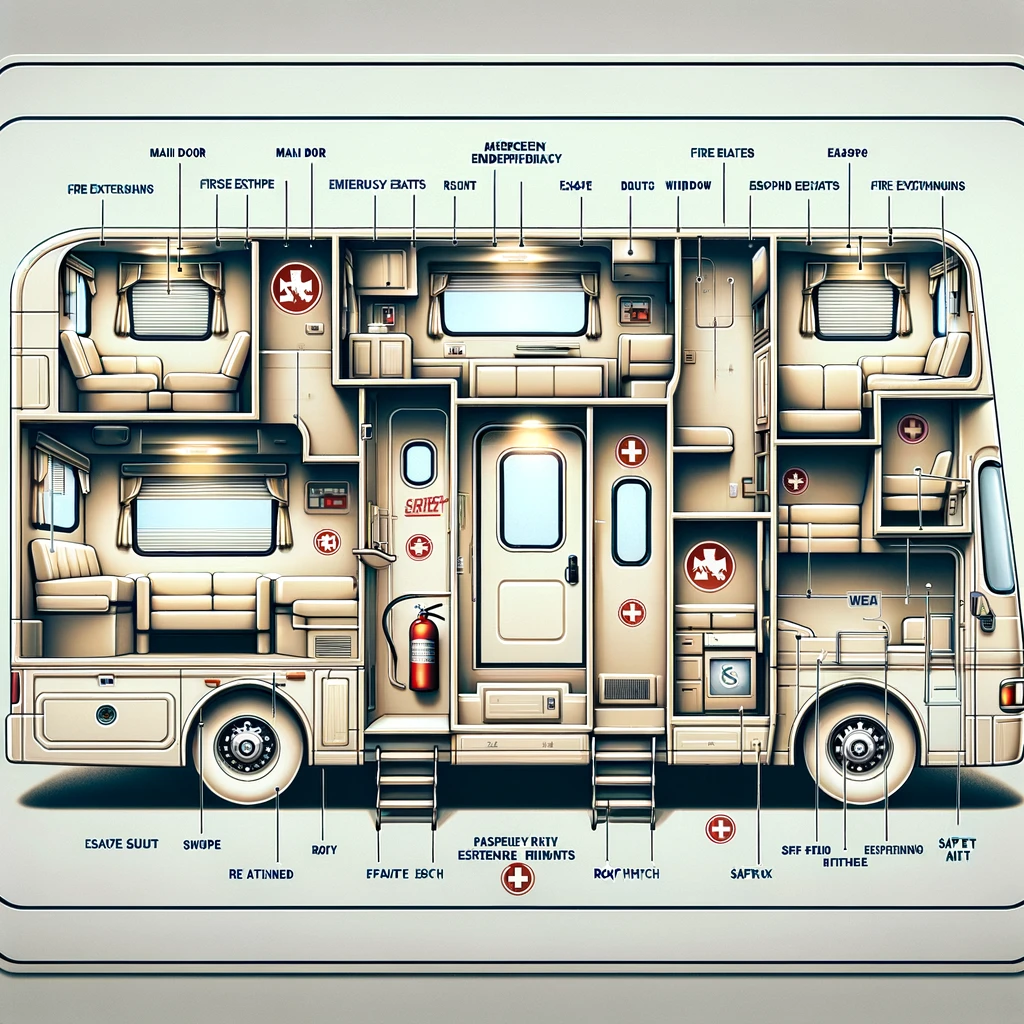

Distress Signals
Whether it’s a physical flare, a horn, or a location-sharing feature on your phone, having a means to signal distress can be lifesaving. Understand when and how to use these tools, and ensure they’re within easy reach.
Training
Consider attending workshops or courses on emergency response, CPR, or basic survival skills. The knowledge you gain can be indispensable, especially when traveling in remote areas.
Insurance and Important Documents
Comprehensive Coverage
Ensure your vehicle insurance is comprehensive, covering not just accidents but also potential damages from natural disasters or theft. Understand the nuances of your policy and consider additional riders for expensive equipment or modifications.
Document Copies
Keep both digital and physical copies of essential documents, including your driver’s license, passport, insurance papers, and medical records. Store these copies separately from the originals, preferably in a waterproof container.
Document Safety
Consider investing in a portable safe or lockbox for your van. This secure storage can safeguard original documents and valuables, providing an additional layer of protection.
International Considerations
If you plan to cross borders, research the insurance requirements of the countries you intend to visit. Some nations may need additional documentation or specific insurance coverage. Being prepared will streamline border crossings and protect you legally.
We hope you’ve found this guide helpful and that it has provided you with some ideas to help keep your van life adventures safe. For more tips & information on everything van life make sure to checkout our range of other articles.
Author
-


Augustus, an intrepid traveler and RV enthusiast, has journeyed across North America, Europe, and Australia, turning his passion for adventure into a life's mission. His love for exploring began in his childhood, with local hikes and camping trips igniting a deep connection with nature. This connection now shines through in his popular travel blog, where he shares not just tips but personal stories, captivating a community of fellow wanderers. His travels are further enriched by his partnership with Zaara, his wife and travel companion, together exploring remote landscapes and diverse cultures. Augustus is also a skilled photographer, capturing the beauty of nature and the essence of his nomadic lifestyle in each shot. His life story is a mosaic of breathtaking experiences, a testament to the beauty of following one’s passions and embracing the unknown, inspiring others to explore the world with the same fervor.
View all posts

